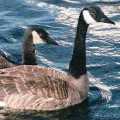|
作者:傑奇•艾倫•朱利安諾 博士
願我、你與吾眾,不隨著肉體殞滅而消失。
願我們每一個人都能活在免於墜入火坑或著火的恐懼中。
願我們選擇的生活方式,
讓生活開展我們的心胸,讓我們減少恐懼,
讓我們人情通達。
願我們每一個人都能體認,
我們的存在,
正是為了讓種子開花綻放,
而讓開花者孕化成果。
--- 道華•馬可沃
每年這個時候,太陽每天造訪華盛頓州西雅圖的時間愈來愈長;湖水和溪流閃閃發光,居民及訪客也享受著溫暖而清爽的空氣。但是今年,這個時節卻也把污點 -- 一塊血漬 -- 帶來這個綠寶石城市。數千隻堂皇的加拿大雁被圈捕和謀殺;牠們被判處死刑的原因是:在公園、高爾夫球場,以及私有財產上排便。

西雅圖的加拿大雁(本文照片均由傑奇•朱利安諾提供)
美國魚類暨野生物管理局對於加拿大雁有管理之責,這種雁是受到保護的候鳥種。今年,該局授權美國農業部底下的野生動物管理局,華盛頓州西部的加拿大雁進行圈捕宰殺了共4,200隻;這個區域共有約2萬到2萬5千隻鳥。
而在去年,農業部也曾獲得授權得以圈捕並宰殺3,500隻雁。同時類似的許可證也在全美各地被發放出去。
對雁類發出微詞的人,大部分是不喜歡鳥出現在他們草坪上的富人。在某些農業區,人們已知雁類會破壞作物。有些人則聲稱糞便中的寄生蟲是一種危險,因為它們會使水道中的藻類數量增加,進而危及水生生物。然而,至今卻尚未有因接觸雁類糞便而生病的文獻紀錄。
大部分的民眾抱怨雁類的糞便讓公園變得髒亂不堪,西雅圖公園處卻始終無力找出方法來清理公園。
公園處的人員聲稱,「不用殺戮」的解決方式不是太貴,就是早就被試過了-如用狗兒驅趕雁、在牠們的巢中放假蛋來降低生殖率,將油塗抹在鳥蛋上以殺死幼鳥-但他們的嘗試頂多是半調子的做法。
西雅圖最大的公園是面積534英畝「發現公園」,我過去任職該公園處的管理者時,常察覺到這個部門忽略了去針對複雜的問題,發展出一種有意義的解決方法。公園處官員通常只採用最快速、最簡單的可能途徑,以平息少數者,通常是富裕的、具有發言權且能使管理部門傾聽他們意見的人士。當價值數百萬元房屋的屋主要求修剪過度生長的草坪時,公園處會立即做出回應。但當我們這些小市民階級的左鄰右舍與公園處接洽,要求清理從福蘭小學通往卡契公園的路徑,這個要求卻被忽略了。
公園處並沒有事先詢問過大家任何意見,就讓農業部的官員開始以屠殺手段掃蕩公園裡的雁鳥。

西雅圖公園與休閒部外的抗議人士
在6月26日的示威活動中,反對屠殺鳥類的抗議者聚集在西雅圖市中心的公園處前廣場。大約有50位抗議者,手持「便便無罪」的標語,並鼓勵機車騎士鳴按喇叭、表示支持終止殺戮行為。當時街上響起許多喇叭聲,甚至連一輛警車經過示威地點時,車上的警員也對抗議者豎起大拇指。這些抗議人士相信,全市的市民普遍都是支持停止殺戮的。
西雅圖公園處由處長肯•龐茲所領導,向來不讓民眾有真正參與討論的機會是其行事作風,也人盡皆知的事。當公園處官員要求公眾意見的參與時,他們是把傳單或信件寄到公園產權周邊4百英呎之內,那些深受雁糞之苦的住家去做調查。
通常,參加公共會議的民眾可說是屈指可數,有時少到只有一兩位。他們的作法不是將會議延後召開,而是在暗地裡做決定。而為了是否屠殺加拿大野雁的問題,他們甚至連這種只出現小貓兩三隻的會議也沒召開過一場。
【文章連載】
■便便就該死嗎? (上)
全文與圖片詳見:http://ens-news.com/ens/jul2001/2001L-07-06g.html
版權所有Environmental News Service,環境資訊協會 (謝洵怡 譯,陳潁峰、蔡麗伶 審校)
中英對照全文:http://e-info.org.tw/issue/animal/2001
/is-animal01110701.htm |
|
By Jackie Alan Giuliano, Ph.D.
May I, may you, may we
not die unlived lives.
May none of us live in fear
of falling or catching fire.
May we choose to inhabit our days,
to allow our living to open us,
to make us less afraid,
more accessible,
to loosen our hearts
until they become wings,
torches, promises.
May each of us choose to risk our significance;
to live so that which comes to us as seed
goes to the next as blossom
and that which comes to us as blossom,
goes on as fruit.
-- Dawna Markova
This time of year, the Sun visits Seattle, Washington more and more each day, sparkling off the lakes and streams as residents and visitors enjoy warm, crisp air. But this time of year also brings a stain - a blood stain - to the Emerald City as thousands of majestic Canada geese are rounded up and murdered. Their capital offense: they have defecated on parks, golf courses and private property.

Canada geese in Seattle (Photos (c) Jackie Giuliano)
The U.S. Fish and Wildlife Service (USFWS) has management responsibility over the Canada geese, a protected migratory species. This year, the USFWS granted a permit for the U.S. Department of Agriculture (USDA) Wildlife Services to round up and kill 4,200 Canada geese in Western Washington, an area with 20,000 to 25,000 birds.
Last year, the USDA was permitted to round up and kill 3,500 geese. Similar permits were issued all over the United States.
Critics of the geese are mostly affluent people who dislike the birds on their lawns. In some agricultural areas, they have been known to damage crops. Some people claim that parasites in the fecal material are a danger and that it increases the algae in waterways, jeopardizing aquatic life. Yet there have been no documented cases of illness from contact with the fecal matter of geese.
Most people complain that it is just plain messy, and the Seattle Parks Department has been unable to come up with a way to clean the parks.
They claim that non-lethal solutions are either too expensive or have been tried - such as using dogs to chase them away, putting fake eggs in their nests to reduce reproduction, and coating eggs with oil to kill them - but their attempts have been half-hearted at best.
As the former manager of the 534 acre Discovery Park, Seattle's largest park, I often observed the Parks Department ignoring the challenge to develop a meaningful solution to complex problems. Parks officials usually take the quickest, easiest path possible in order to silence the few, usually affluent, vocal individuals who have the ear of department management. When a homeowner in a multi-million dollar home adjacent to a park calls about overgrown grass, the department jumps. When the neighbors on my simple middle class street contacted the department to clear the path leading from Viewlands Elementary School to Carkeek Park, the request was ignored.
No public comment was sought before the department allowed USDA officials to begin sweeping the parks to kill the geese.

Protesters outside the Seattle Parks and Recreation Department
In a demonstration on June 26, opponents of the killings gathered outside the Parks Department headquarters in downtown Seattle. About 50 protesters, with signs such as "No Death Penalty for Pooping," encouraged motorists to honk if they support an end to the killing. There was much honking on the street. A police car passed the demonstration, and the police officers gave the demonstrators a thumbs-up. The activists believe that there is widespread support across the city to end the killing.
The Seattle Parks Department, headed by Superintendent Ken Bounds, is well known for not seeking true public involvement. When Parks Department officials do ask for input, they hand out flyers or send out a mailing to homes within 400 feet of the park property in question.
Usually, only a handful of people show up at a public meeting, sometimes as few as one or two. Rather than postpone the meeting, decisions are quietly made. Not even one of those inadequate public meetings has been held on the issue of killing Canada geese.
http://ens-news.com/ens/jul2001/2001L-07-06g.html
|
